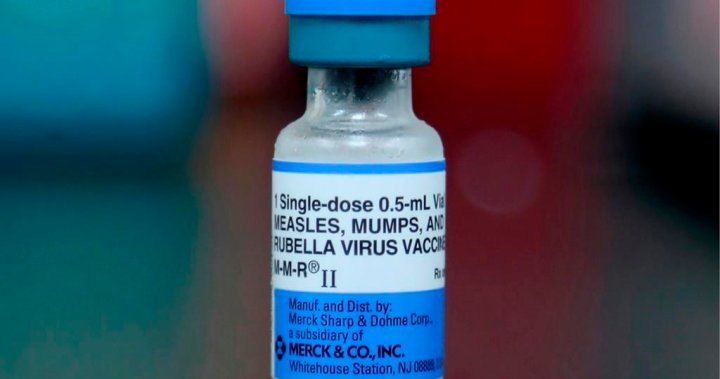Two companies that supply measles vaccines to Canada say they are running short on doses.
The disclosure comes as the highly contagious infection is spreading across the country and with health authorities strongly advising Canadians to be fully vaccinated against the disease, especially before travelling.
Pharmaceutical giants Merck and GlaxoSmithKline (GSK) posted reports to Canada’s drug shortage website showing they are experiencing shortages for their MMR vaccines used to vaccinate against measles, mumps and rubella, with remaining doses reserved for public immunization programs.
The companies both cite “demand-increase for the drug” as the reason why. Merck’s posting shows remaining doses of its MMR II vaccine are “reserved for the public immunization program.” GlaxoSmithKline’s states the same for its Priorix shot, saying “supply (is) unavailable in the private market.”
Merck’s filing shows the company expects the shortage to end in nearly a month on April 19. GlaxoSmithKline’s estimated end date is “unknown.”

Merck also reported an anticipated shortage for its MMRV jab ProQuad, which also inoculates against varicella virus as well as measles, from March 22 until April 19.
The latest health and medical news
emailed to you every Sunday.
The latest health and medical news
emailed to you every Sunday.
The reduction likely only affects people seeking to get another dose ahead of travelling though the shortages come as measles has been spreading in Canada.
The federal government declared it eliminated from Canada in 1998 after an immunization campaign, but last week Public Health Ontario said there were more confirmed cases in 2024 than in all of last year, rising from seven in 2023 to eight as of March 13. Quebec has reported 29 cases as of March 20. Other provinces including Saskatchewan and British Columbia have also reported infections.
“Measles is one of the most highly communicable infectious diseases, and can very easily spread to other people if they are susceptible,” Health Canada previously told Global News.
An infection causes flu-like symptoms and a rash in most cases but can be fatal, according to the Public Health Agency of Canada. The best protection against it is two doses of vaccine, with a second dose providing nearly 100 per cent efficacy, according to Health Canada.
The vaccine is administered as a two-shot series, with the first shot given at around 12 to 15 months of age and second shot at 18 months or between ages five and six years (before your child starts school).

The World Health Organization said COVID-19 disrupted many vaccinations globally.
On March 19, the WHO director of immunization Kate O’Brien said it is “really critical” to catch up.
More than 50 countries reported “large and disruptive” measles outbreaks in the past year, which is twice as many as the year before, according to the WHO.
GSK did not immediately respond to requests for comment about the vaccine shortages.
In a statement to Global News Thursday, Merck said it is aware of the shortage and is working to “provide a consistent supply of (its measles vaccines) in a timely manner.”
Health Canada also did not immediately respond.
— with files from Global News’ Katie Dangerfield, Gabby Rodrigues, Reuters’ Jennifer Rigby and The Associated Press
© 2024 Global News, a division of Corus Entertainment Inc.










